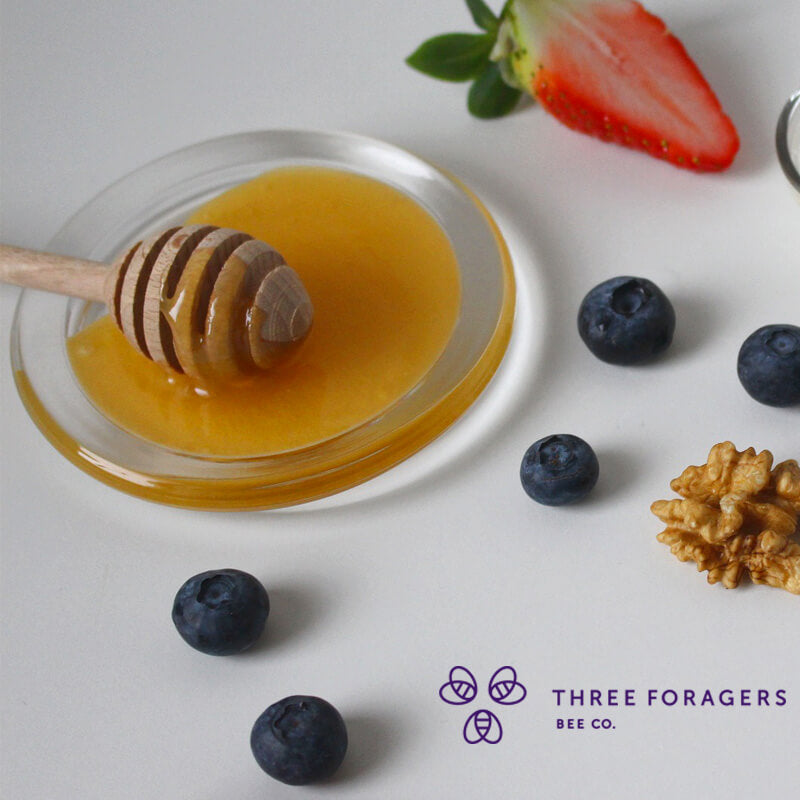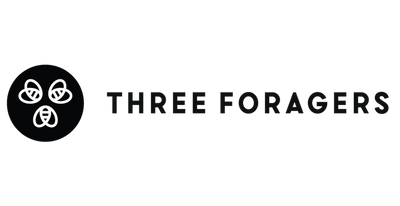

· By Three Foragers
Health Benefits And Concerns Of Eating Raw Honey
When searching for your next jar of honey, a major consideration you’ll need to make is between processed or raw honey. Many people mistakenly believe that unprocessed raw honey is dangerous to consume and will automatically default to buying the processed variety. Some also think that there isn’t any difference at all between the two kinds. There is a lot of information out there so we thought we’d help clear the air.
How Is Raw Honey Made?
Our raw, unpasteurized honey is collected right from the beehive, strained to remove major impurities like beeswax, then bottled. Bees make amazing honey, and we keep it that way. Each jar of raw honey is harvested at the right time, and we only take what the bees don’t need. This keeps our bees happy and healthy.
Processed honey has a few more steps before it’s bottled.
After harvesting honey from the beehives, it is pasteurized and heavily filtered. Pasteurization involves heating up the honey to remove the yeast that is naturally found in nectar. Removing the yeast eliminates any possible chance of the honey fermenting and slows down the granulation process. While there are no risks associated with consuming fermented honey, pasteurized honey will remain in its liquid state longer than raw honey, which is particularly useful if it is dispensed from a squeeze bottle.
This is unlike the dairy industry when pasteurization is needed to kill harmful bacteria. The high acidity and low moisture content of raw honey prevent bacteria and other harmful organisms from growing.
Further honey filtration after it is pasteurized removes any excess air bubbles, creating a transparent product that many consumers find aesthetically appealing.
To summarize, raw honey is just what it sounds like - raw. Processed honey is heated up and filtered to stay in its liquid state for a longer period. While this does help initially, it does not prevent granulation forever. To return granulated honey to its liquid state, gently heat it up.
Nutritional Differences Between Processed And Raw Honey
The processing of any type of food affects its nutritional value, including honey.
The lack of increased filtrations and pasteurization means that raw honey has a higher nutritional value versus its processed counterpart which includes: amino acids, vitamin B6, thiamine, niacin, riboflavin, pantothenic acid, calcium, copper, iron, magnesium, manganese, phosphorus, potassium, sodium, zinc, enzymes, and antioxidants called polyphenols. Polyphenols help to fight off serious diseases including heart disease and certain types of cancers.
The high heat of pasteurization kills off most of these beneficial enzymes, antioxidants, and certain vitamins too.
Processed Honey May Have Hidden Ingredients
The only ingredient in our raw honey is, well, honey. To keep up with the high demand for cheap honey in North America, some of the commercial honey you see in stores is imported from overseas. This raises concerns about additives like high fructose corn syrup, rice syrup, or other sweeteners blended into the final product that are not represented on the label.
Transporting honey overseas increases the environmental impact of the product. The Three Foragers Farms are in Saskatoon and Vancouver Island, so our raw honey has minimal shipping to get to your home or local shop.
Health Concerns With Eating Honey
Raw honey and processed honey can contain a bacteria known as Clostridium botulinum. This bacteria is especially harmful and potentially fatal to children under the age of one as their digestive system has not developed enough to handle the bacteria. Clostridium botulinum causes an illness known as botulism. We recommend not feeding our raw honey (or any honey for that matter) to infants under the age of one.
Picking A Healthy Honey
When looking for the healthiest honey, choose one that is raw or unpasteurized. The pasteurization process removes so many beneficial nutrients just so you can squeeze it out of a plastic bottle. That’s why we package our raw honey in jars! You can also be 100% certain that everything in those jars is honey straight from the beehive. If you have any questions about our honey or our hives, leave a comment below or send us a message on Facebook! We’d be happy to answer all your raw honey inquiries.
Share:
1 comment
-
Thanks for the info.
No my name is not a joke.debbie honey on
